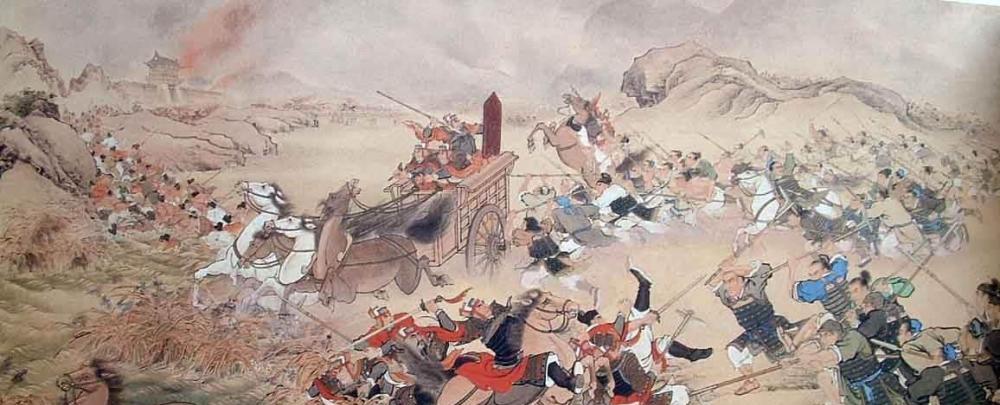The list of gods, I believe many people have seen, is a more classic mythological theme TV series.
Chinese mainland and Hong Kong have both filmed such TV series.
The general content is that many Heavenly Soldiers and Heavenly Generals will fight the whole process of the Shang Dynasty King before they canonize the gods, and then they will seal the gods one by one for the sake of the Heavenly Path and the elimination of harm for the people.
If you were told that the content of this mythological TV series really happened in history, would you be shocked to drop your jaw?
King Wu's cutting of the Shang Dynasty is a historical event that occurred around 1046 BC, when Ji Fa, the King of Zhou Wu, led a coalition of various princes to rebel against the King of Shang, and finally established the Zhou Dynasty to destroy the Shang.

The inscription of the Western Zhou Ligui excavated in Lintong, Shaanxi in 1976 records that "King Wu Zhengshang, Wei JiaZi Dynasty, Nian Ding, Ke Di You Shang".
According to the records, the king of Shang was absurd, cruel and unkind, not only proud of his achievements, but also spent huge sums of money to build Lutai, build wine ponds and meat forests, and lived a decadent life of poverty and luxury, making the national treasury empty and the people's resentment boiling.
He was self-conscious, never listening to the opinions of loyal subjects, but obeying the words of the women around him, and maiming the loyal and righteous soldiers of the DPRK.
Even his own uncle Bigan was brutally killed.
The King of Shang, who listened to the woman's absurd remarks, once imprisoned Ji Chang, the King of Zhou Wen of the Zhou Dynasty, who was subordinate to the Shang Dynasty, and also tortured Ji Chang to extract a confession and imposed a cannon on him.
Ji Chang's eldest son, Bo Yi kao, saved his father's heart and offered treasures and beautiful women to the King of Shang, only to release Ji Chang.
Who knew that the King of Shang was so cruel that he brutally killed Bo Yikao and made it into a broth, and lured Ji Chang to drink the broth.
Seeing that Ji Chang obediently obeyed, he let down his guard and released Ji Chang.
After Ji Chang returned to China, instead of being devastated by the pain of losing his son, he exerted himself to make every effort to govern, advocating the development of production while recruiting soldiers and buying horses and waiting for opportunities.
The State of Zhou successively attacked the states of Chongguo, Inurong, Qi, Qi, and Mishu, and its power penetrated into the scope of the Shang Dynasty.
Various princes who had long been dissatisfied with the Shang Dynasty and resented them allied themselves with the Zhou State.
At this time, the Zhou kingdom was already divided into two of the three worlds, and Ji Chang moved the capital to Fengdu in order to advance the Shang Dynasty at any time.
At this time, the sky was unpredictable, people had bad luck, and Ji Chang had not yet completed the great cause of destroying business.
Subsequently, Ji Chang's second son Ji Fa succeeded to the throne, and Ji Fa, who inherited Ji Chang's legacy, became the King of Zhou Wu, and there was this historical event of The King of Wu's cutting.
After Ji Fa succeeded to the throne, the army with Jiang Ziya as his military division officially rebelled against the Shang Dynasty.
The Shang Dynasty, which had long provoked public resentment, was distraught in the military, and the generals had no intention of fighting, and even turned against each other.
In the end, due to the huge disparity in strength, it only took one year of resistance, ending many years of tyranny.
The wuwang felling was a major event of special significance in Chinese history and a great revolution in Chinese civilization.
After the Battle of Makino, the Battle of I was won, ending the brutal rule of the Shang Dynasty.
After the success of the logging, the Western Zhou Dynasty began to implement a system of sub-feudalism, and China established the Zhou Dynasty for 800 years.
The economy, culture, and productivity of the Zhou Dynasty were higher than those of the Shang Dynasty, and the civilization of the Chinese nation was cultivated.
Many documents have recorded this historical event of the Wu King's harvesting and are real.
However, fengshen said that it is believed that it was invented by posterity in order to enrich the plot and attract attention.
In the real incident, there was no Tota Li Heavenly King, no Third Prince Nezha, and no divine spells and immortals.
Only history buried by time.
The universe exists in more than one space and dimension
Is there really Chang'e on the moon?
Is the Moon a monitor?
Were computers from 2,000 years ago the technology of prehistoric civilizations, or were they the products of extraterrestrial civilizations?
Could it be the roar of the alien creatures?
Friends who think the article is good, may wish to click a free follow, your support is my greatest motivation!